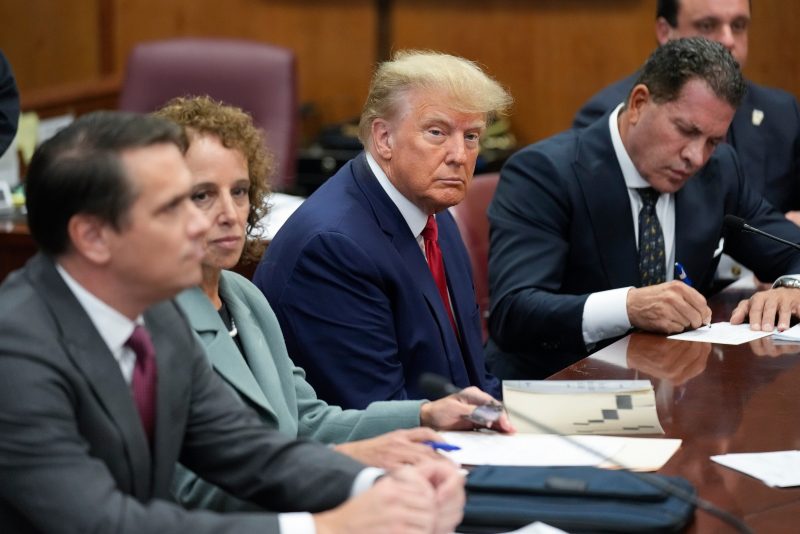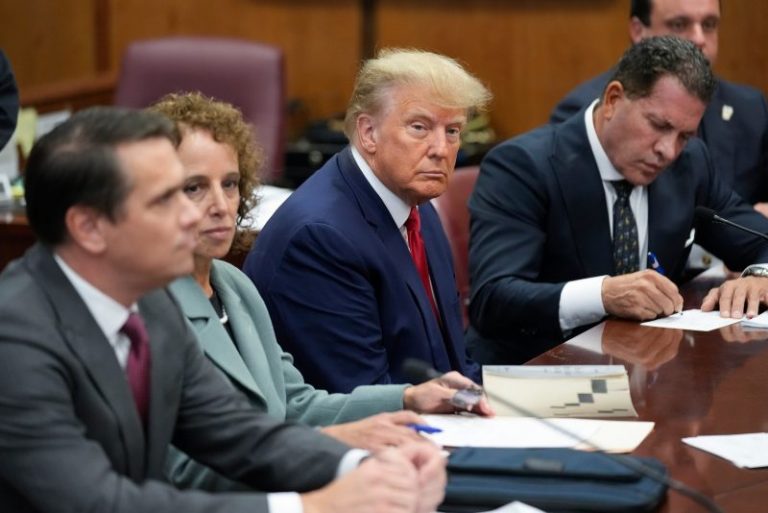
Since his indictment in New York more than two months ago, Donald Trump’s support in the GOP presidential primary has only gotten stronger. His general-election polling has remained steady and in some polls has even improved a bit.
Which leads to the obvious question: What if it happens again?
It appears that special counsel Jack Smith’s probe into Trump’s retention of and failure to return classified documents after leaving the White House is winding down. That case poses perhaps Trump’s most significant legal liability. Trump’s lawyers were at Department of Justice headquarters Monday arguing Trump should not be charged. And Trump’s former attorney general, William P. Barr, indicated Tuesday that he thinks not only that Trump will be charged, but that Trump would also deserve it.
“This is not a case of the DOJ conducting a witch hunt,” said Barr, who had repeatedly applied the “witch hunt” label to earlier legal scrutiny of Trump.
Whether Republicans or general election voters agree — and adjust their view of Trump accordingly — is to be determined. But what seems clear is that more Americans, Republicans included, view these potential charges as serious. And while another indictment might not be enough to sink Trump in a GOP primary, the possibility of this one for now appears more problematic, especially for his general-election hopes.
The pollster YouGov recently provided the most in-depth data on views of Trump’s legal jeopardy since shortly after his indictment in late March. It tested which of Trump’s various legal problems were viewed as potentially “serious crimes,” and how much people regard such “serious crimes” as being disqualifying.
The first thing to note: As with previous polls, people are less concerned about the charges Trump faces in Manhattan. While 52 percent of Americans regard it as a “serious crime” to falsify business records to conceal hush money payments to an adult-film star — the lowest percentage of five issues tested — 65 percent say the same about taking highly classified documents from the White House and obstructing efforts to retrieve them.
Among just Republicans, while 28 percent say the former is serious, 42 percent say the latter is.
This would suggest that there is a more significant universe of people who could be turned off by a classified documents indictment. And crucially, that could stretch beyond a small majority of voters if the case is strong.
Much also depends on how much people would regard a conviction as being disqualifying. And that’s where this poll is especially helpful.
The survey also asked whether people thought Trump should be allowed to serve as president if he’s convicted of a “serious crime.” Just 23 percent overall said he should be, while 62 percent said he shouldn’t be. Republicans were more evenly split, with 39 percent saying a serious crime would be disqualifying.
The overlap between these two questions — how many people view serious crimes as disqualifying and regard these particular things as serious crimes — is also crucial.
Happily, YouGov combined the data for us.
Regarding the Manhattan indictment, 41 percent of independents and 44 percent overall view the alleged crime as serious and also say it would be disqualifying.
Those numbers go up to 49 percent and 50 percent, respectively, in the classified documents case.
That’s nearly half of voters who, to the extent the case is proved in their minds, say Trump would be disqualified.
That may not seem all that different from Trump’s many other controversies, in which half or sometimes slightly more Americans judged him poorly because of them. But this is people saying he shouldn’t even be considered for office in that case — not just that he will have done something seriously wrong.
This is considerably less of a hurdle in the GOP primary. While 18 percent of Republicans would regard a Manhattan conviction as serious and say a serious crime would be disqualifying, that number is only slightly higher (21 percent) in the classified documents case. So while 4 in 10 Republicans say the latter would be a serious crime, only about half of that number say they’d rule out Trump because of it.
Of course, some of those opinions could trend harsher if the evidence against Trump is damning. Likewise, Republicans who say they’re concerned or that this would be disqualifying could temper their opinions if Trump were indicted (and nominated), because of the pull of partisanship.
For instance, YouGov polling conducted before Trump’s Manhattan indictment showed 73 percent of Republicans said it would be “a crime for a candidate for elected office to pay someone to remain silent about an issue that may affect the outcome of an election.” But after Trump was charged for exactly that and people realized the question was about him, that number dropped below a majority.
Still, there are sizable chunks of the general-election electorate — 49 percent of independents and 21 percent of Republicans — that Trump will need to appeal to and win a fair number of votes from.


Comments are closed.